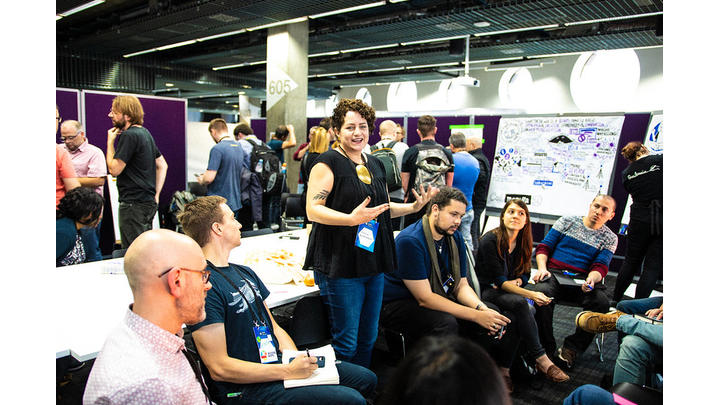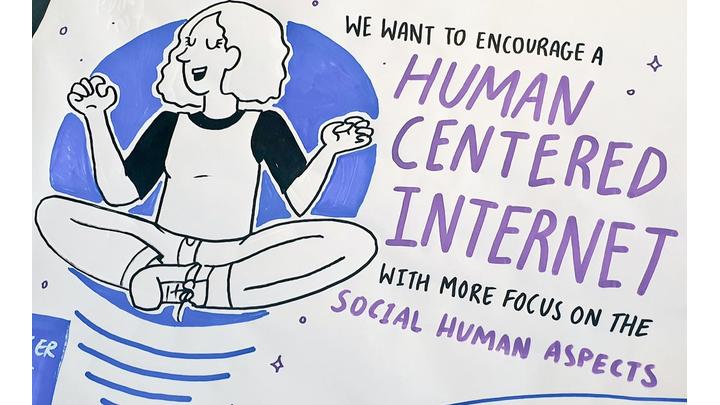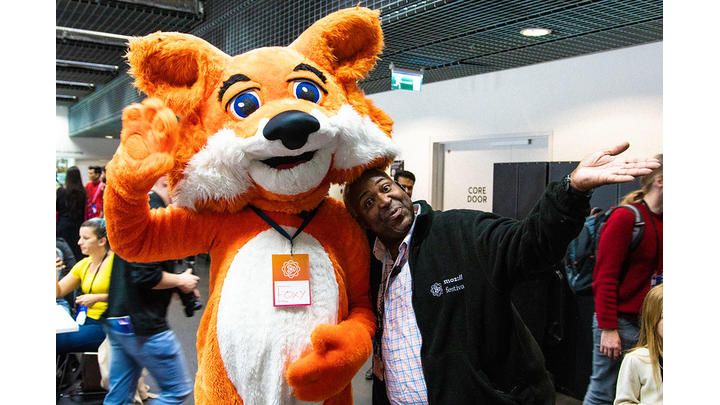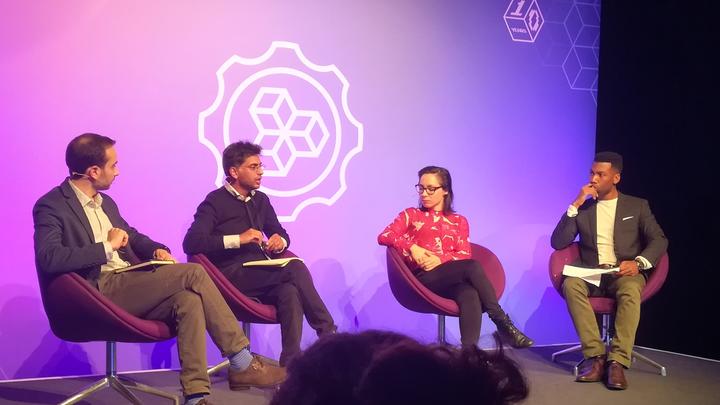Mozfest 2019
Nov 19, 2019
The Mozilla Festival (also known as MozFest) covers a range of topics focusing on creating a better internet. The theme for this year’s Mozilla Festival was healthy AI. The sessions were organised in broad topics as in previous years – web literacy, openness, digital inclusion, decentralisation, privacy and security, youth zone, queering, neurodiversity, dialogues and debates. Libraries Connected gave bursaries to six library workers to attend the festival.
Algorithms and AI
by Aude Charillon, Newcastle Libraries

Photo by Connor Ballard-Pateman, published under Creative Commons license
I went to MozFest wanting to learn more about AI. I felt I had a confused understanding of it and wanted clarification. This came very quickly in one of the Saturday sessions I attended: The algorithmic gaze with Cansu Canca (AI Ethics Lab) and Guillaume Chaslot (AlgoTransparency). Asked what the difference between AI and algorithms was, the speakers replied succinctly:
'Artificial intelligence is just a fancy way to talk about algorithms!'
An algorithm can be described as a set of rules followed by a computer to answer questions or solve problems. The way an algorithm is written and the data it relies on will have an impact on the “decision” it reaches. That’s why so many sessions at MozFest focused on the ethics of AI and making AI more transparent and open. The speakers mentioned some current problems with AI:
- Algorithms and radicalisation on social media
Social media platforms are meant for user participation. Having an algorithm that gives more visibility to posts users are likely to engage with is better for the platform. Radicalisation increases participation: people are more likely to comment or share to agree or disagree. Having an algorithm that maximises engagement is going to maximise radicalisation.
- How can you trust AI to genuinely help you?
When we use online services to get answers or find the best solution for us, we often assume that the results we get will be in our best interests. However, sometimes the answer given will be the one that brings the online service the most benefit – and not necessarily the cheapest or the best for us. Platforms (the speakers mentioned Uber and YouTube) are not transparent about the recommendations of their AI-powered services.
For several years I have been interested in digital skills in libraries. Public library staff teach citizens to use computers and digital devices. We help people use the Internet and online services. We strive to give them the skills that are going to help them be better digital citizens and make informed decisions – understanding the code behind the interface, retrieving information, assessing information, recognising how their personal data is used. Listening to the different speakers at MozFest made me think about how we could add new aspects to our digital skills activities at Newcastle Libraries related to understanding how algorithms work and what impact AI can have. NB: Toronto Public Library is already offering workshops on the topic.
From internet trolling to Harry Potter
By Kerala Cotter, Libraries Unlimited
This year focused on brilliant and unique views of healthy AI. This included over 300 interactive sessions looking at web literacy, digital inclusion, neurodiversity and much more. My weekend began with a science fair where I viewed some amazing projects. There was a machine that attempted to read facial emotions as well as algorithms to prevent different kinds of internet trolling, from racism to sexism. The most immersive room of the night was the games room, participants could choose to sit down and play a game or two on an open sourced platform which would give credit/money straight to the game's creator.
This led into the amazingly diverse weekend of workshops and talks. My first talk on the Saturday was a great opener, led by a passionate kindergarten librarian who uses robots and stem friendly tools to help tell stories. In the case of Plumply, Dumply Pumpkin by Mary Serfonzo, the readers would set up a code-a-pillar or equivalent to hunt down the pumpkin features. This enabled children to create their own carved pumpkin face and have fun experimenting with coding.

 Photo by Connor Ballard-Pateman, published under Creative Commons license
Photo by Connor Ballard-Pateman, published under Creative Commons license
One workshop I visited used a microbit robot to draw using coded movements and in another session, I used scratch to program some simple games. The Harry Potter sorting hat program might be a good one for Harry Potter Day! Although a lot of these sessions involved a tool or item already known to me, the people all had different ways of using them and helpful tips. One of my goals for the weekend was to find ways to implement healthy web literacy to all people, even neurodiverse audiences.
Many of the sessions I visited implemented this attitude including a talk using augmented reality. In the session you could use a QR code to bring a three-dimensional molecule to life on your phone screen, which you could then view and rotate, This made studying easier to understand and items easier to imagine. So many sessions demonstrated the possibilities of items and ideas that we could use in our libraries and validated the exciting digital paths that Libraries Unlimited are already exploring.
Libraries: the future of the internet
By Claire Duffield, Leeds Libraries
This was my first visit to MozFest. I was overwhelmed by the breadth of sessions available and the diverse range of topics. I chose to use my Google calendar to organise myself but soon found I was double or triple booked. As my remit is digital engagement I really wanted to attend sessions most relevant to my role or those I could feed back to colleagues so settled on the following:
- Making Augmented Reality postcards with A-Frame and AR
I felt this workshop would really link into using simple tech to bring stories and our collections alive. Unfortunately, I only had a library issue laptop with me so could not download the software, I looked over someone's shoulder and had a really interesting discussion around imagination and if AR and other tech means we are limiting our own visualisation as it is done for us. A short film on how the postcards work can be viewed here vimeo.com/298873547 I do think AR is engaging, especially for our items hidden away in our stacks and it is something I would like to explore further and develop for future events and visitor experience within libraries. Something low cost and accessible we can develop in house is very appealing. Open source instructions can be found here: github.com/edsilv/aframe-workshop

- Data visualization: Dead or alive?
I chose this workshop as I am planning a data visualisation workshop using live data to create an artwork projected from one of our windows and created by young people. I wanted to find out if this would be relevant to our audience and brainstorm ways on how to make it happen. This was a hands on workshop, in groups we were asked to visualise the most creative ways in which to visualise data sets. This mainly focused around looking at how design will work to create an experience for the user, for example could it be a game or turned into a narrative.
- Monitor your plant’s health using Internet of Things
This workshop tied into my own interests as a bit of a crazy plant lady but also as inspiration for Leeds Libraries planned Do Your:bit workshops in partnership with Leeds Museums. The workshop walked us through connecting a moisture device to an Arduino board. The device would then measure moisture levels within your plant pot and instruct you on when to water. This way of connecting tech to environmental monitoring has inspired me to look at ways of creating miniature environments we can measure and adapt when look at global climate issues using a micro:bit. Find the makers portfolio here: www.handyandydesigns.com/geoffmcintyre
- Fusing storytelling and tech to bring us closer together
I found this workshop very inspiring. We were introduced to storytelling through digital platforms and then asked to discuss methods we could use. Our group brainstormed a prototype which reached socially isolated individuals, using audio technology such as an Alexa to record and tell stories. Individuals with little or no digital skills would be able to share their stories to their networks. This would keep stories alive which would otherwise be lost, create networks to elevate loneliness and celebrate storytelling as an art form. We are trialing Alexa loans as part of our Dementia Pathfinder with 100% Digital Leeds and The Good Things Foundation.
My biggest take away from the festival was one of sharing, being open with sessions plans, ideas and creating a culture of openness within our workplace and networks. Encouraging others to become active creators through digital and service design rather than being passive consumers. I feel libraries are the perfect environment to adopt and celebrate these ideals as the world moves forward with technology and innovation. One of the session participants went as far to say libraries are the future of the internet as trusted gate keepers – I didn’t argue!

Photo by Connor Ballard-Pateman, published under Creative Commons license
Libraries and tech – the unexpected overlap
By Seth Fright, Coleford Library
It would be easy to assume that libraries and technology festivals do not go together, after all learning to create .dat files or virtual realms is not particularly relevant to most of our borrowers. Personally, I wasn’t sure what to expect from Mozfest. I know a bit of coding, but I am by no means a programmer. If anything, I am an artist who uses technology to empower people and assist the creative process. Would I really have anything useful to contribute at a tech-festival?
I had nothing to worry about. I overcame my imposter syndrome in the first session, which was about the limitations of A.I. driven facial recognition. It turned out that the core problem was more social than technical. Moreover, many of the other sessions that I attended turned out to be based around solving ongoing social or ethical problems with new technology.
There were whole floors dedicated to sessions around LGBT+ inclusivity, neurodiversity and arts and culture; with facilitators and attendees from a vast range of cultural backgrounds. Many of the issues discussed were ones that we confront in libraries on a daily basis: inclusivity, access to technology, increasing digital literacy, tackling isolation and loneliness and many more.
Out of all the amazing conversations and sessions that I attended that weekend, there was one that really underlined the importance of libraries in enabling digital literacy. ‘TechFun4All – Accessibility in Technology and Digital Making’ was run by Eddie, a 14-year-old with an invisible disability which causes him considerable pain. Eddie told us about growing-up unable to take part in physical activity, isolated from his peers; until one day he got a raspberry pi and started making ‘cool gadgets’. Finally, he had found something that he could do with his friends.
He started a flourishing coding club at his local library and has now gone on to start his own charity: ‘TechFun4All’. It aims to encourage and support others following in his footsteps to gain community support and wellbeing through shared making. The library provides the support and the space for Eddie to create his own safe community space, and Eddie brings the technology and the know-how.
There is immense potential for technologists and libraries to work together to build and empower their own communities, paying forward to benefit society on a much larger scale in the future. I feel incredibly privileged to sit between the worlds of libraries and technology – exactly the right place to help it happen.
Data rebels and digital involvement
By Iona Richardson, Richmond Libraries
I was lucky enough to receive a funded place for this year’s MozFest thanks to Libraries Connected. A buzzing hub of talks, workshops, seminars and activities, MozFest is focussed on the open internet. This is an important conversation to be part of; the internet should be a tool for open and equitable access to information, and libraries can provide examples of this as well as using an open internet to help further our own goals. All the sessions were fascinating and useful, but some stuck with me.
- Marietje Schaake’s talk on data rebels
Despite having served as an MEP and been named Stanford University’s Cyber Policy Center’s international policy director, her talk focussed less on the technical or legal details of data policy and instead was a call to arms. Noting the difference between enthusiastic attendees at events like MozFest and her mother, who would probably view the young crowd and their heavily stickered laptops with suspicion or distant indulgence, Schaake pointed out it’s the man on the street who needs convincing. Tech-savvy individuals are engaged in the issues of the open internet and data protection, but can be elitist – especially when politicians and other people in the public eye are mocked for making mistakes when it comes to technology.
- The panel on digital policy
Here panellists talked about how annoying cookie pop-ups can seem like a real obstacle, when in fact it’s the intrusive and unnecessary gathering of hordes of personal data that’s the issue. This 'don’t shoot the messenger' comment, together with Schaake’s talk, reminded me of the members of the public I speak to about technology. Many have neither the time nor inclination to sift through jargon-filled tech blogs and legislation to figure out what’s happening to their data – or why they should care. These are the people we must connect to, to explain in plain English what they need to know. Working together with politicians, educators and the public, we can build an open and inclusive internet that works for everyone, on their own terms.

- Are public spaces needed in an increasingly digital world?
Some people envisioned spaces to interact with others completely free from digital. Some didn’t see digital interaction as real interaction, and wanted public spaces as a place to have measured discussions of the kind they didn’t see online. Other people were keen to incorporate digital into their public space, to increase reach, accessibility or expand a limited physical area. The main thing I took away from the session was that people need digital involvement in their spaces to be careful and optional.Digital innovation is a great tool for those who prefer it or can use technology to access spaces where they would otherwise struggle. However, asking people to use technology without providing another option – or simply not making them feel welcome in a digital world that they feel forced into – leads some to be effectively locked out of their public spaces, feeling like unwanted interlopers lost in unfamiliar digital terrain. I found it especially striking how strongly some people disliked the idea of being unable to disconnect from the digital. It certainly gave me a lot to think about, not least in terms of making sure everyone feels welcome and comfortable using digital services when the library provides them.
MozFest was a brilliant experience and I couldn’t begin to fit everything I learnt and discussed into one short blog piece; I am very grateful to Libraries Connected for funding my place.
